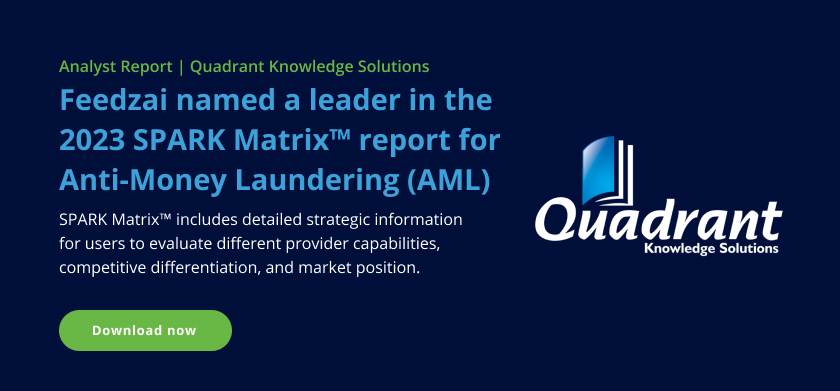Doesn’t it seem like new financial threats crop up in the blink of an eye? That’s why anti-money laundering (AML) programs are pivotal to safeguarding the integrity and security of financial services. Banks must prioritize AML data transparency to understand the risks and possibilities of new financial realities and fortify their defenses.
Data lies at the core of any effective AML program. To embrace greater AML transparency, banks need access to comprehensive, accurate, and meaningful data.
The good news is that, in many cases, such data exists within the bank’s ecosystem. The bad news is that the correct data isn’t always available to AML departments. Sometimes, the data utilized by AML systems and investigators isn’t helpful.
AML transparency is not just about access to data. It’s about enabling effective analysis and presenting its results in a way that is clear for stakeholders. Learn the critical challenges with banks’ AML data strategy and how improved data practices can enhance their AML programs’ transparency and decision-making.
2 Common AML Data Challenges for Banks
High-quality data is critical for banks to detect and prevent financial crimes. However, the data landscape is far from ideal, presenting various challenges. These challenges include:
1. AML Data Blind Spots
A significant amount of data never finds its way into AML monitoring. This creates blind spots in a bank’s defenses.
For example, some data is only available in front office systems. Meanwhile, other channels might disconnect from AML systems. Other data may be accessible but only available in a format that is too difficult to utilize effectively.
In the past, front office staff helped by noticing strange behavior and giving more information for investigations. However, the digital age has led to a decline in human interaction within the banking sphere. This has significantly reduced such controls’ effectiveness.
In other words, digital banking channels have replaced brick-and-mortar branches as the primary client interface. AML monitoring in today’s world requires better data usage from online banking channels.
2. A Deluge of Irrelevant AML Data
Moreover, the issue isn’t just the lack of data; it’s also about the quality of the available data. Low-quality information inundates many AML systems. This contributes to a high false positive rate and inefficient investigations.
This information overload hinders investigators from dedicating their valuable time to substantial investigations. Instead, lots of confusing, irrelevant, or misleading data bog them down. The prevalence of high-volume but low-value data muddies the water and interferes with AML teams’ ability to see the most essential information.
Both of these issues with data transparency can hinder AML teams’ effectiveness, making it harder to make and rationalize their decisions. Banks must reconsider how their AML programs embrace automation, give compliance professionals the tools needed to make decisions, and ultimately stay ahead of new regulations.
7 Strategies to Improve AML Transparency
To enhance AML transparency, banks must employ strategies that address these challenges and pave the way for more effective anti-money laundering efforts. The following steps provide a robust roadmap for banks to overhaul their AML transparency.
1. Flexible Systems for Rapid Adaptation
Automation is already a key feature in many banks’ AML systems. This typically refers to the rules-based monitoring many banks use to trigger transaction monitoring reviews. However, in today’s rapidly evolving banking environment, relying solely on static rules is ineffective.
Criminals quickly adapt and outmaneuver, and AML programs must keep up. Instead, banks need flexible AML systems that quickly adapt to new developments. AML monitoring should be viewed as a dynamic process that adjusts swiftly to align with the industry’s shifting needs.
2. Reevaluate the Relevance of Data
As banking trends change, so does the relevance of specific data types. New data types should become part of the AML review process when new channels and technologies emerge. Conversely, previously reliable data may need to be updated as client behavior changes.
Banks must carefully select the most relevant data to incorporate into their AML systems and adapt their monitoring approach for optimal use. AML transparency depends on presenting clear narratives, which makes it imperative to understand which data holds the most significance for AML teams’ decision-making processes.
3. Stay Ahead of Regulatory Changes
As new payment types and channels emerge, so do new financial crime risks. Banks must proactively familiarize themselves with these new avenues and understand how criminals exploit them to effectively combat these challenges, even ahead of regulatory changes, which can be slow to appear.
By taking the initiative in implementing proactive controls, banks can remain ahead of regulatory changes and, in turn, protect their customers effectively. Banks that understand new threats and prepare for new rules will be better situated when new regulations or guidance are issued.
4. AML Teams Should Act as Business Partners, Not Preventers
In too many cases, AML departments are perceived as obstacles in a bank’s path to business development. This is partly because the culture of AML compliance is to avoid unnecessary risk. However, banks will want to embrace new payment channels and methods, and AML teams can be an essential part of these initiatives. By assuming the partner role, AML teams can help their banks navigate new payment channels and enable business growth while continuing to mitigate AML risk.
5. Challenging the Status Quo
Many AML processes have been practiced the same way for a long time. These include highly manual tasks and reliance on repetitive workflows.
However, banks can no longer accept these processes as the norm because they’ve always been done that way. It’s time to embrace more advanced automation, AI, and machine learning to make AML processes more transparent. This both improves efficiency and helps banks understand how decisions are made, thereby identifying opportunities for improvement.
6. Ensuring Explainable Decisions
With the growing prevalence of AI and machine learning, the transparency of decision-making is paramount. Banks must ensure that the decisions of their systems are transparent and easy to understand, even for individuals lacking technical expertise. After all, how can banks truly embrace transparency if they cannot explain their decisions to relevant stakeholders?
7. Nurturing a Culture of AML Transparency
Nurturing a culture of AML transparency is not just a step; it’s an ongoing commitment. Banks must instill this culture across all levels of the organization, from top leadership to operational and IT staff. Transparency should be a guiding principle in all AML practices and policies, including data and technology strategies. It’s vital as banks increasingly embrace digital approaches and rely less on front-office staff for essential insights into customer behaviors.
The need for AML transparency is not a choice; it is a necessity. To maintain the integrity and security of the financial services industry, banks must centralize clean and relevant data, ensuring it is complete and accurate. In a world where financial crime is an ever-present threat, transparency is the key to strengthening the industry’s defenses against money laundering and financial crimes.
Share this article:
Karin Yuklea
Karin Yuklea is an AML Subject Matter Expert and part of Feedzai’s Product Strategy team. With over 20 years of experience delivering innovative Financial Crime solutions to the financial services industry, Karin has deep subject matter expertise in anti-money laundering, sanctions, and KYC/CDD; across the full spectrum of compliance, operations, technology, data, and analytics. Prior to joining Feedzai, Karin held a variety of senior roles at several market leading technology and management consulting firms, including NICE Actimize, Promontory (IBM), Navigant, and Matrix-IFS. Over the years, Karin has helped many financial institutions around the world transform their financial crime programs, address regulatory issues, optimize operations, and achieve their strategic goals.
Related Posts
0 Comments5 Minutes
Spotlight on Denmark: Fraud and Financial Crime Insights from ‘Den sorte svane’
The recent documentary mini-series "Den sorte svane" has sent shockwaves through Danish…
0 Comments10 Minutes
Enhancing Anti-money Laundering Systems Architecture
A speaker at a financial crime conference I recently attended summed up the problem with…
0 Comments8 Minutes
Avoid AML False Positives in 3 Easy Steps
High false positive rates are considered the norm for many financial institutions. But…


